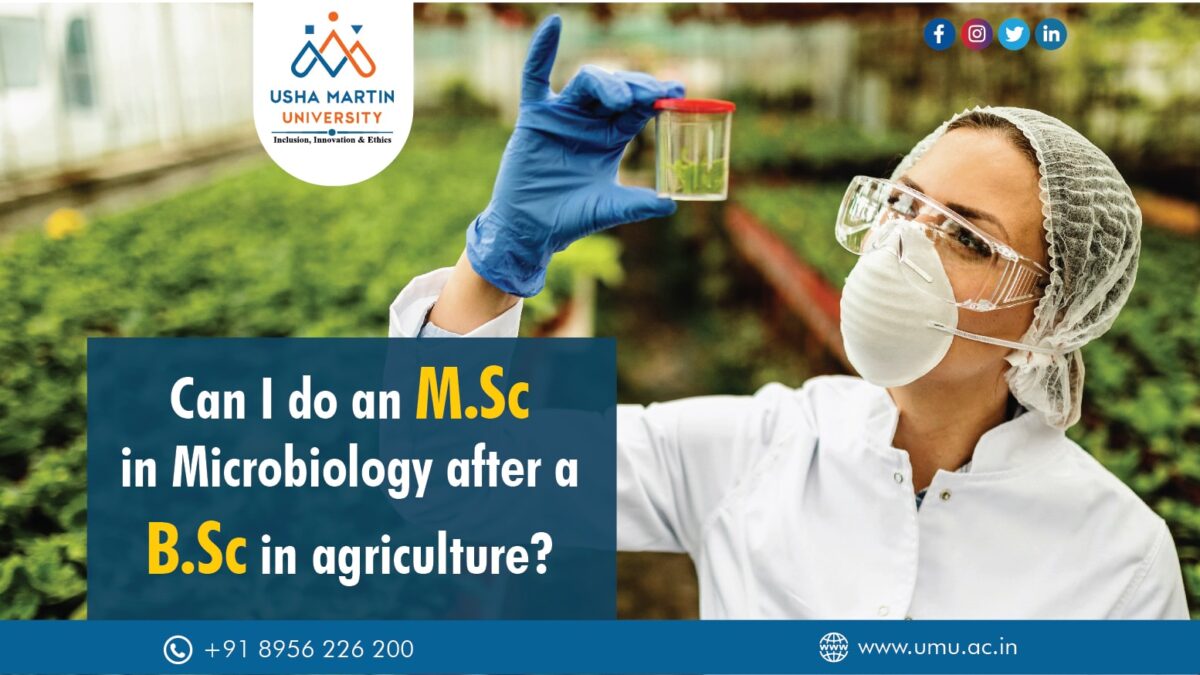
Top Career Opportunities After Completing MCA in Data Science
May 9, 2023
What is the Scope of BCA Specialization in Cyber Security with TCS?
May 20, 2023Yes, it is possible to take M.Sc. Microbiology admission after completing a B.Sc in Agriculture. Although the two fields are different, they are related in terms of their scientific principles and the skills required to succeed in either field. Usha Martin University specializes in imparting M.Sc Microbiology as a field of study and considered to be one of the best Agriculture college in Ranchi.
You may need to take additional courses in microbiology or related subjects to meet the admission requirements for an M.Sc. in Microbiology program. It is important to research and select a program that aligns with your interests and career goals, and to check the specific admission requirements of each program.
Some universities may also require you to take an entrance exam and submit a research proposal as part of the application process. Additionally, relevant work experience or research experience can be an advantage when applying for graduate school. Usha Martin University announces admission open M.Sc Agriculture(Microbiology).
Overall, with the appropriate preparation, you can pursue a Master’s degree in Microbiology after completing a Bachelor’s degree in Agriculture.
Bacteria, viruses, fungi, and parasites are microscopic organisms are found in every aspect of life and play a crucial role in various fields such as healthcare, food production, agriculture, environmental science, and many others. With the advancements in science and technology, the scope of microbiology has expanded rapidly, making it a highly sought-after field for higher education. Pursuing an M.Sc. in Microbiology in India is an excellent opportunity for students interested in a career in microbiology.
India is one of the fastest-growing economies in the world, and the country has a growing demand for skilled professionals in the field of microbiology. According to the Indian Brand Equity Foundation, the Indian biotechnology industry is expected to grow at a compound annual growth rate of 30.46% by 2025. This growth is driven by the increasing demand for new drugs, vaccines, and medical devices, as well as the growing interest in sustainable agriculture and environmental conservation. As a result, there is a growing demand for skilled microbiologists who can develop new technologies and products that cater to these needs.
The scope of an M.Sc. in Microbiology in India is vast and varied, and graduates have numerous career options to choose from. Microbiology graduates can work in various industries, including biotechnology, pharmaceuticals, food production, and environmental science. They can work in research and development, quality control, regulatory affairs, and production, among other fields. Here are some of the career options available for graduates of an M.Sc. in Microbiology in India.
Future Career & Job Profiles after M.Sc. in Microbiology in India –
-
Medical Microbiologist
Medical microbiologists work in hospitals, clinics, and diagnostic laboratories, where they use their knowledge of microorganisms to diagnose and treat infectious diseases. They perform tests on patient samples, interpret test results, and advise clinicians on the appropriate treatment options. They may also be involved in research to develop new diagnostic tools, vaccines, and therapies.
-
Pharmaceutical Microbiologist:
Pharmaceutical microbiologists work in the pharmaceutical industry, where they develop and test new drugs and vaccines. They may also be involved in quality control, ensuring that products meet regulatory standards and are safe for use. They work closely with other scientists and engineers to develop new technologies and processes for drug production.
-
Food Microbiologist
Food microbiologists work in the food production industry, where they ensure that food products are safe for consumption. They monitor food production processes, test for contaminants, and advise food producers on how to prevent contamination. They may also be involved in research to develop new food preservation and processing methods. Usha Martin University is the top University in Ranchi and its Faculty in Agriculture are well experienced and seasoned.
-
Environmental Microbiologist
Environmental microbiologists work in the field of environmental science, where they study microorganisms in the natural environment. They may be involved in research to understand the role of microorganisms in ecosystem functioning and to develop new technologies for environmental monitoring and remediation. They may also work in environmental consulting, advising clients on how to manage environmental risks.
-
Agricultural Microbiologist
Agricultural microbiologists work in the field of agriculture, where they use their knowledge of microorganisms to improve crop yields and soil health. They may be involved in research to develop new biofertilizers , biopesticides , and other agricultural products. They may also work in agricultural consulting, advising farmers on how to improve crop yields and manage pests and diseases.
Conclusion:
In addition to these career options, graduates of an M.Sc. in Microbiology in India can also pursue a career in academia or research. They can work as professors, research scientists, or postdoctoral fellows in universities, research institutions, and government agencies.
The demand for skilled microbiologists is expected to grow in the coming years, making it an excellent time to pursue an M.Sc. in Microbiology in India. However, there are many career opportunities like research, teaching and industry opportunities. Microbiology is a growing field, and there is a high demand for qualified and skilled microbiologists in various sectors.





